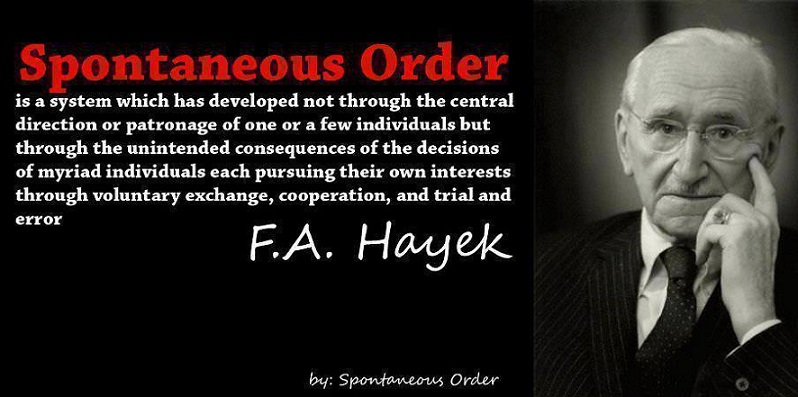The first peculiarity of a spontaneous order is that by using its ordering forces (the regularity of the conduct of its members) we can achieve an order of a much more complex set of facts than we could ever by deliberate arrangement, but that, while availing ourselves of this possibility of inducing an order of much greater extent than we otherwise could, we at the same time limit our power over the details of that order. We shall say that using the former principle we shall have power only over the abstract character but not over the concrete detail of that order.
-F.A. Hayek ( “The Principles of a Liberal Social Order”)
Free Markets are just that – free from Government intervention or “guidance”. Consumers do just that – consume. Producers do exactly that – produce stuff that, hopefully, consumers want. To do so, especially if it is a product vs a service, it is rare that a single company is so vertically oriented that they make everything their end product requires. Thus, that leads to all kinds of cooperation.
Some of it is organized by buyers relying on past trading partners that they trust to supply “widgets” they work for them. In other cases, it’s a search for other widgets and coming to terms with unknown folks they’ve never dealt with. And that process is continued all the down to the least sub-assembly or part. And that endpoint producer may never have known that Producer A ever wanted or needed their product. The only “organizing” may be simply a price point, a set of product specifications, and promised lead times; the people don’t know each other and could not have communicated beforehand.
The “ordering” is considered to be “spontaneous” and ad hoc in nature; there is no overall “Great Mind” that is in charge – people and companies just orgranize themselves in support of their own self-interests and goals.
Prof Don Boudreaux: …Market’s spontaneous-ordering forces…
For the market to function as well as is possible, we cannot pick and choose which particular prices and resource-allocation patterns we like and which we don’t. We cannot forcibly attempt to change the prices and patterns that we don’t like into ones that better suit our fancy, while expecting the prices and resource-allocation patterns that are not the direct objects of our intervention to remain unchanged. The enormous interconnectedness of markets simply will not allow such an outcome.
Not only is any such intervention an attempt to unfairly exempt some workers and resource owners from having to abide by the rules of the market, the unintended and unseen consequences – both economic and political – are very likely to be worse than whatever benefits might be expected from the ‘success’ of the intervention.
(H/T: Cafe Hayek)
